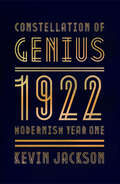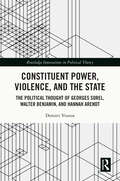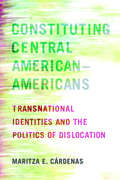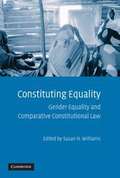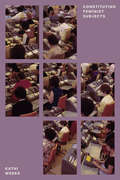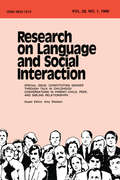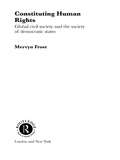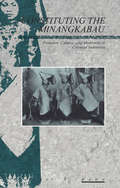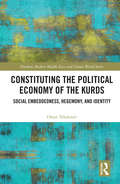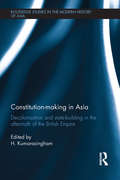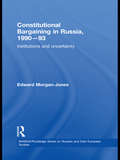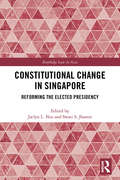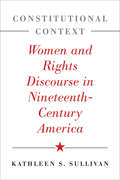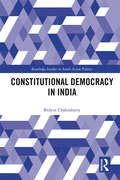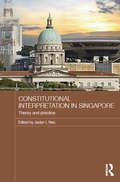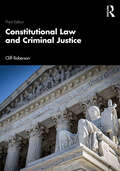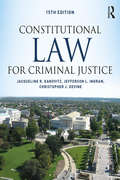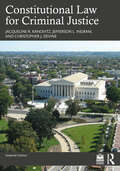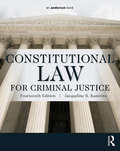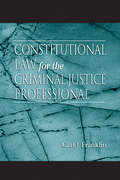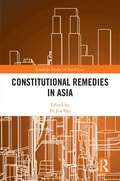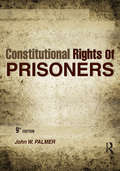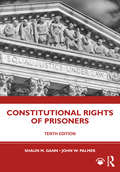- Table View
- List View
Constellation of Genius: 1922, Modernism Year One
by Kevin JacksonEzra Pound referred to 1922 as Year One of a new era. It was the year that began with the publication of James Joyce's Ulysses and ended with the publication of T. S. Eliot's The Waste Land, two works that were arguably "the sun and moon" of modernist literature, some would say of modernity itself.In Constellation of Genius, Kevin Jackson puts the titanic achievements of Joyce and Eliot in the context of the world in which their works first appeared. As Jackson writes in his introduction, "On all sides, and in every field, there was a frenzy of innovation." It is in 1922 that Hitchcock directs his first feature; Kandinsky and Klee join the Bauhaus; the first AM radio station is launched; Walt Disney releases his first animated shorts; and Louis Armstrong takes a train from New Orleans to Chicago, heralding the age of modern jazz. On other fronts,Einstein wins the Nobel Prize in Physics, insulin is introduced to treat diabetes, and the tomb of Tutankhamun is discovered. As Jackson writes, the sky was "blazing with a ‘constellation of genius' of a kind that had never been known before, and has never since been rivaled."Constellation of Genius traces an unforgettable journey through the diaries of the actors, anthropologists, artists, dancers, designers, filmmakers, philosophers, playwrights, politicians, and scientists whose lives and works—over the course of twelve months—brought a seismic shift in the way we think, splitting the cultural world in two. Was this a matter of inevitability or of coincidence? That is for the reader of this romp, this hugely entertaining chronicle, to decide.
Constellations Systémiques Familiales et Traumatismes: Transformer les expériences traumatisantes de manière guérissante
by Marc BacoSocial Sciences - Relief in traumatic situations Le traumatisme est un événement si grave que la question de l'ordre, des liens et de l'équilibre dans les concessions mutuelles - les trois principaux domaines classiques de la constellation familiale - passe à l'arrière-plan et ne peut généralement être abordée qu'après s'être penché sur le traumatisme. La puissance d'un traumatisme chevauche généralement énergiquement les autres principes de la constellation familiale. L'ignorer et travailler sur l'ordre, par exemple, peut donc s'avérer futile et sans résultat. Dans ce livre, je me réfère au traumatisme en faisant la distinction entre événements ponctuels et événements continuels. Je traite en particulier les traumatismes du développement, même prénatales, qui peuvent affecter toute une vie.
Constituent Power, Violence, and the State: The Political Thought of Georges Sorel, Walter Benjamin, and Hannah Arendt (Routledge Innovations in Political Theory)
by Dimitri VourosIn Constituent Power, Violence, and the State, Dimitri Vouros examines the question of political violence by placing the thought of Georges Sorel, Walter Benjamin, and Hannah Arendt in conversation with contemporary theories of sovereignty and constituent power.Vouros argues that the violence sustaining the modern state inhibits institutional accountability and derails constituent power. The paradox of modern law—which is both the expression of the people’s will but also alienated from them—sets the stage for political contestation. For Vouros, the multitude’s potentiality is actualized through either organized or spontaneous acts of resistance against state force. Antagonism is therefore a key element of the political and must be included in any theory of political agonism. A strong notion of constituent power ensures the integrity of the public sphere and the expansion of citizens’ political agency. Bringing all these ideas together is unique for this field of investigation.Accessible and engagingly written, Constituent Power, Violence, and the State is a must read for researchers in political theory and political philosophy. Critical legal studies scholars and social theorists will also profit from this book.
Constituting Central American–Americans: Transnational Identities and the Politics of Dislocation (Latinidad: Transnational Cultures in the United States)
by Maritza E. CárdenasCentral Americans are the third largest and fastest growing Latino population in the United States. And yet, despite their demographic presence, there has been little scholarship focused on this group. <P><P>Constituting Central American-Americans is an exploration of the historical and disciplinary conditions that have structured U.S. Central American identity and of the ways in which this identity challenges how we frame current discussions of Latina/o, American ethnic, and diasporic identities. <P><P>By focusing on the formation of Central American identity in the U.S., Maritza E. Cárdenas challenges us to think about Central America and its diaspora in relation to other U.S. ethno-racial identities.
Constituting Equality: Gender Equality and Comparative Constitutional Law
by Susan H. WilliamsConstituting Equality addresses the question, how would you write a constitution if you really cared about gender equality? The book takes a design-oriented approach to the broad range of issues that arise in constitutional drafting concerning gender equality. Each section of the book examines a particular set of constitutional issues or doctrines across a range of different countries to explore what works, where, and why. Topics include (1) governmental structure (particularly electoral gender quotas); (2) rights provisions; (3) constitutional recognition for cultural or religious practices that discriminate against women; (4) domestic incorporation of international law; and (5) the role of women in the process of constitution-making. Interdisciplinary in orientation and global in scope, the book provides a menu for constitutional designers and others interested in how the fundamental legal order might more effectively promote gender equality.
Constituting Feminist Subjects (Feminist Classics)
by Kathi WeeksA groundbreaking attempt to theorise the feminist subjectOne of the most important tasks for contemporary feminist theory is to develop a concept of the subject able to meet the challenges facing feminist politics. Although theorists in the 1980s raised the problem of feminist subjectivity, Kathi Weeks contends that the limited nature of that discussion now blocks the further development of feminist theory. While the problems of an already constituted essentialist subject have become patent, what remains as an ongoing project, Weeks contends, is a theory of the constitution of subjects capable of explaining the processes of social construction. This book presents one such account. Drawing on a number of different theoretical frameworks, including feminist standpoint theory, socialist feminism, and poststructuralist thought, as well as theories of peformativity and self-valorization, the author proposes a nonessential feminist subject—a theory of constituting subjects.
Constituting Gender Through Talk in Childhood: Conversations in Parent-child, Peer, and Sibling Relationships:a Special Issue of research on Language and Social interaction
by Amy SheldonThis issue explores some of the ways in which gender, as a social construction, might be rooted in and contingent on conversational processes in childhood. The interconnections between language and gender in three key developmental sociolinguistic contexts are examined: talk between parent and child, talk among friends, and talk between siblings. When children learn to speak a language, they also learn to use it in ways that can reflect, resist, or ignore their culture's norms of acceptable feminine and masculine behavior. The authors of these articles explore the concept of talk as a medium in which both young children and the adults in their world "do" gender. This collection should act as a springboard for more thinking about ways to untangle gender and context, and to show their interconnectedness as well.
Constituting Human Rights: Global Civil Society and the Society of Democratic States (Routledge Advances in International Relations and Global Politics #17)
by Mervyn FrostGlobal civil society and the society of democratic states are the two most inclusive and powerful global practices of our time. In this book, Frost claims that, without an understanding of the role that individual human rights play in these practices, no adequate understanding of any major feature of contemporary world politics from 'globalisation' to 'new wars' is possible. Constituting Human Rights, therefore argues that a concern with human rights is essential to the study of International Relations.
Constituting the Minangkabau (Explorations in Anthropology)
by Joel KahnThis account of culture and society in the villages of West Sumatra, Indonesia, during the period of Dutch colonialism is based on materials collected from the colonial archives, local Indonesian newspapers and recent fieldwork in Malaysia and Indonesia. The author argues that the impact of colonial land-grabbing and political control led to the formation of a peasant economy in the period. At the same time, the author tackles issues in the recent anthropological debates about ethnography and culture to argue that this period also witnessed the construction of what we now call 'Minangkabau Culture' - a process that involved western ethnographers, colonial officials and Minangkabau intellectuals in an often conflicted process of modern cultural transformation.
Constituting the Political Economy of the Kurds: Social Embeddedness, Hegemony, and Identity (Durham Modern Middle East and Islamic World Series)
by Omer TekdemirThis book examines the development of Kurdish political economy and the emergence of collective Kurdish identity within a historical context through three main periods: the late-Ottoman Empire, the initial Republican Turkey era, and then the post-1990s period. It relates historical developments to the dynamics of Kurdish society, including the anthropological realities of the nineteenth century through the moral economy frame, the evolving nature of nationalism in the early twentieth century and the more recent construction of a modern political Kurdishness by means of radical democracy, and an agonistic pluralism shaped by left-wing populism.
Constitution Making Under Occupation: The Politics of Imposed Revolution in Iraq
by Andrew AratoThe attempt in 2004 to draft an interim constitution in Iraq and the effort to enact a permanent one in 2005 were unintended outcomes of the American occupation, which first sought to impose a constitution by its agents. Andrew Arato is the first person to record this historic process and analyze its special problems. He compares the drafting of the Iraqi constitution to similar, externally imposed constitutional revolutions by the United States, especially in Japan and Germany, and identifies the political missteps that contributed to problems of learning and legitimacy.
Constitution-making in Asia: Decolonisation and State-Building in the Aftermath of the British Empire (Routledge Studies in the Modern History of Asia)
by H. KumarasinghamBritain’s main imperial possessions in Asia were granted independence in the 1940s and 1950s and needed to craft constitutions for their new states. Invariably the indigenous elites drew upon British constitutional ideas and institutions regardless of the political conditions that prevailed in their very different lands. Many Asian nations called upon the services of Englishman and Law Professor Sir Ivor Jennings to advise or assist their own constitution making. Although he was one of the twentieth century’s most prominent constitutional scholars, his opinion and influence were often controversial and remain so due to his advocating British norms in Asian form. This book examines the process of constitutional formation in the era of decolonisation and state building in Asia. It sheds light upon the influence and participation of Jennings in particular and British ideas in general on democracy and institutions across the Asian continent. Critical cases studies on India, Pakistan, Sri Lanka, Malaysia and Nepal – all linked by Britain and Jennings – assess the distinctive methods and outcomes of constitution making and how British ideas fared in these major states. The book offers chapters on the Westminster model in Asia, Human Rights, Nationalism, Ethnic politics, Federalism, Foreign influence, Decolonisation, Authoritarianism, the Rule of Law, Parliamentary democracy and the power and influence of key political actors. Taking an original stance on constitution making in Asia after British rule, it also puts forward ideas of contemporary significance for Asian states and other emerging democracies engaged in constitution making, regime change and seeking to understand their colonial past. The first political, historical or constitutional analysis comparing Asia’s experience with its indelible British constitutional legacy, this book is a critical resource on state building and constitution making in Asia following independence. It will appeal to students and scholars of world history, public law and politics.
Constitutional Bargaining in Russia, 1990-93: Institutions and Uncertainty (BASEES/Routledge Series on Russian and East European Studies)
by Edward Morgan-JonesThe years 1990-93 were a critical moment in Russia’s political development. This book provides a systematic explanation of outcomes of constitutional bargaining processes in Russia, which radically reshaped the institutions of the Russian state: removing Russia from constitutional subordination to the Soviet Union in 1990; creating a presidency and a constitutional court in 1991; and restructuring the relationship between the central state and its component federal units with the passage of three Federal Treaties in 1992. The book explores the reasons for these outcomes and identifies why there were consistent delays to the passage of a new Russian constitution as well as why negotiations eventually broke down. The book assesses the plausibility of different theoretical approaches to constitutional choice and argues that the role of uncertainty (and politician's strategic responses to uncertainty) in shaping constitutional outcomes has been under-explored by rational choices approaches to constitutional bargaining. Using a rich set of source materials - including roll call votes, parliamentary records, unpublished parliamentary and constitution commission documents, Russian newspapers - the book provides a detailed study of Russian politician's decision making about constitutional choices. It is a valuable resource to those interested in Russia and post-communist politics, the origins of political institutions, comparative government, democratisation and development studies.
Constitutional Change in Singapore: Reforming the Elected Presidency (Routledge Law in Asia)
by Jaclyn L. Neo Swati JhaveriOnce a ceremonial position modelled after the constitutional monarchy in the United Kingdom, the office of the President of Singapore was transformed from an appointed to an elected one in 1991. As the head of state, but not the head of government, the elected President was to have additional discretionary powers involving the spending of financial reserves, appointment of high-ranking public servants, and certain ministerial powers to detain without trial. In 2016, a constitutional commission was convened to consider further reforms to the office and the elections process. This book explores Singapore’s presidency, assessing how well it has functioned, discussing the rationales for an elected presidency, and evaluating the constitutional commission’s recommendations for reforms, including the need for minority representation in the office. In doing so, the book provides important reflections on how the constitutional reform process raises crucial questions about the rule of law and the practice of constitutionalism in Singapore.
Constitutional Context: Women and Rights Discourse in Nineteenth-Century America (The Johns Hopkins Series in Constitutional Thought)
by Kathleen S. SullivanWhile the United States was founded on abstract principles of certain "unalienable rights," its legal traditions are based in British common law, a fact long decried by progressive reformers. Common law, the complaint goes, ignores abstract rights principles in favor of tradition, effectively denying equality to large segments of the population. The nineteenth-century women’s rights movement embraced this argument, claiming that common law rules of property and married women’s status were at odds with the nation's commitment to equality. Conventional wisdom suggests that this tactic helped pave the way for voting rights and better jobs. In Constitutional Context, Kathleen S. Sullivan presents a fresh perspective.In revisiting the era’s congressional debates, state legislation, judicial opinions, news accounts, and work of political activists, Sullivan finds that the argument for universal, abstract rights was not the only, or best, path available for social change. Rather than erecting a new paradigm of absolute rights, she argues, women’s rights activists unwittingly undermined common law’s ability to redress grievances, contributing heavily to the social, cultural, and political stagnation that characterizes the place of women and the movement today.A challenging and thoughtful study of what is commonly thought of as an era of progress, Constitutional Context provides the groundwork for a more comprehensive understanding and interpretation of constitutional law.
Constitutional Democracy in India (Routledge Studies in South Asian Politics)
by Bidyut ChakrabartyConstitutional democracy is both a structure of governance and a way of providing an ideological perspective on governance. The 1950 Constitution of India established constitutional democracy in India and the narrative of the rise and consolidation of constitutional democracy in India cannot be understood without comprehending the politico-ideological processes that consolidated simultaneously both colonialism and constitutional liberalism. This book examines the processes leading to constitutionalizing India and challenges the conventional idea that the Constitution of India is a borrowed doctrine. A careful study of the processes reveals that the 1950 Constitution was the culmination of an ideational battle that had begun with the consolidation of the British Enlightenment philosophy in the early days of British paramountcy in India. The book therefore argues that constitutionalizing endeavour in India had a clear imprint of ideas which had its root in this philosophy. The study reveals a striking continuity of the same kind of ideological sentiments when the nationalists devised their own constitutionalizing design, visible in the 1928 Motilal Nehru report and which reappeared in the 1945 Sapru Committee report. Deviating from the conventional study of constitutional evolution of a polity, which is generally legalistic, this book explores the processes since the beginning of colonial rule in India which led to the conceptualization of constitutional democracy in a milieu engaging with arguments formulated by James and JS Mill. A detailed analysis of the roots of constitutional and political liberalism in India, this book sheds light on the material surrounding India’s constitutional development. It will be of interest to scholars in the field of Indian Political Theory, South Asian Politics and History.
Constitutional Interpretation in Singapore: Theory and Practice (Routledge Law in Asia)
by Jaclyn L NeoAt the heart of constitutional interpretation is the struggle between, on the one hand, fidelity to founding meanings, and, on the other hand, creative interpretation to suit the context and needs of an evolving society. This book considers the recent growth of constitutional cases in Singapore in the last ten years. It examines the underpinnings of Singapore’s constitutional system, explores how Singapore courts have dealt with issues related to rights and power, and sets developments in Singapore in the wider context of new thinking and constitutional developments worldwide. It argues that Singapore is witnessing a shift in legal and political culture as both judges and citizens display an increasing willingness to engage with constitutional ideas and norms.
Constitutional Law and Criminal Justice
by Cliff RobersonIlluminating US constitutional concepts in plain language and clarifying nuances in the law, this third edition of Constitutional Law and Criminal Justice simplifies understanding of the United States judicial system for those without advanced legal training. It updates recent decisions by the Supreme Court of the United States and includes a discussion on the current makeup and policy of the Supreme Court. Learning objectives and summary outlines of recent Supreme Court decisions, combined with practical examples and selected actual court documents, enhance students’ understanding of the most important issues regarding the US Constitution and its application in the criminal justice system. The book begins with an overview of the Bill of Rights, followed by an examination of the components of the judiciary. It moves on to a discussion of due process; the First, Fourth, Fifth, Sixth, and Eighth Amendments; and the exclusionary rule. A unique chapter addressing civil liability and the criminal justice professional is especially relevant to students in criminal justice programs. Concise and informative, this book is designed to be used in undergraduate courses in criminal justice and justice administration programs in universities and community colleges.
Constitutional Law for Criminal Justice
by Jefferson L. Ingram Jacqueline R. Kanovitz Christopher J. DevineCriminal justice professionals often do not receive the training they need to recognize constitutional principles that apply to their everyday work. Constitutional Law for Criminal Justice offers a way to solve this problem by providing a comprehensive, well-organized, and up-to-date analysis of constitutional issues that affect criminal justice professionals. Constitutional Law for Criminal Justice makes complex concepts accessible to students at all levels of criminal justice education. The chapters begin with an outline and end with a summary. Key terms and concepts are defined in the glossary. Tables, figures, and charts are used to synthesize and simplify information. The result is an incomparably clear, student-friendly textbook that has remained a leader in criminal justice education for 50 years.
Constitutional Law for Criminal Justice
by Jefferson L. Ingram Jacqueline R. Kanovitz Christopher J. DevineConstitutional Law for Criminal Justice, Sixteenth Edition, offers criminal justice professionals the training they need to recognize the constitutional principles that apply to their daily work. Jacqueline R. Kanovitz, Jefferson L. Ingram, and Christopher J. Devine provide a comprehensive, well-organized, and up-to-date analysis of constitutional issues that affect the U.S. justice system. Chapter 1 of Part I summarizes the organization and content of the Constitution, the Bill of Rights, and the Fourteenth Amendment. The next eight chapters cover the constitutional principles that regulate investigatory detentions, traffic stops, arrests, use of force, search and seizure, technologically assisted surveillance, the Wiretap Act, interrogations and confessions, self-incrimination, witness identification procedures, the right to counsel, procedural safeguards during criminal trials, First Amendment issues relevant to law enforcement, and capital punishment. The final chapter covers the constitutional rights of criminal justice professionals in the workplace, their protection under Title VII of the Civil Rights Act, and their accountability under 42 U.S.C. § 1983 for violating the constitutional rights of others. Part II contains abstracts of key judicial decisions exemplifying how the doctrines covered in earlier chapters are being applied by the courts. The combination of text and cases creates flexibility in structuring class time. This book makes complex concepts accessible to students in all levels of criminal justice education. The chapters begin with an outline and end with a summary. Key Terms and Concepts are defined in the Glossary. Tables, figures, and charts are used to synthesize and simplify information. The result is an incomparably clear, student-friendly textbook that has remained a leader in criminal justice education for more than 50 years. The accompanying Instructor and Student Resources website provides free digital materials designed to test student knowledge and save time when preparing lessons. Resources include: Student access to practical quizzes including multiple-choice and true-or-false questions, and case studies with interactive questions and answers to test and apply knowledge A downloadable comprehensive study guide, glossary, and appendix including the text of the United States Constitution to enhance understanding of each chapter alongside study Step-by-step Instructor Guides and premade lesson slides that correspond to the chapters in an editable format to saving valuable time on lesson preparation Instructor access to test-bank questions for further exam practice
Constitutional Law for Criminal Justice (14th Edition)
by Jacqueline R. KanovitzCriminal justice professionals often do not receive the training they need to recognize the constitutional principles that apply to their daily work. Constitutional Law for Criminal Justice offers a way to solve this problem by providing a comprehensive, well-organized, and up-to-date analysis of constitutional issues that affect criminal justice professionals. Chapter 1 summarizes the organization and content of the Constitution, the Bill of Rights, and the Fourteenth Amendment. The next eight chapters cover the constitutional principles that regulate investigatory detentions, traffic stops, arrests, use of force, search and seizure, technologically assisted surveillance, the Wiretap Act, interrogations and confessions, self-incrimination, witness identification procedures, the right to counsel, procedural safeguards during criminal trials,?First Amendment issues relevant to law enforcement, capital punishment, and much more. The final chapter covers the constitutional rights of criminal justice professionals in the workplace, their protection under Title VII of the Civil Rights Act, and their accountability under 42 U.S.C. § 1983 for violating the constitutional rights of others. Part II contains abstracts of key judicial decisions exemplifying how the doctrines covered in earlier chapters are being applied by the courts. The combination of text and cases creates flexibility in structuring class time. Constitutional Law for Criminal Justice makes complex concepts accessible to students in all levels of criminal justice education. The chapters begin with an outline and end with a summary. Key Terms and Concepts are defined in the Glossary. Tables, figures, and charts are used to synthesize and simplify information. The result is an incomparably clear, student-friendly textbook that has remained a leader in criminal justice education for more than 45 years.
Constitutional Law for the Criminal Justice Professional
by Carl J. FranklinWritten in a simple, straightforward manner, this book will help today's criminal justice student better understand con law issues as well as the complicated development of constitutional rights and law. In its simple, easy to understand format, this book is a must for both current criminal justice professionals and students studying to enter the p
Constitutional Remedies in Asia (Routledge Studies in Asian Law)
by Po Jen YapMany jurisdictions in Asia have vested their courts with the power of constitutional review. Traditionally, these courts would invalidate an impugned law to the extent of its inconsistency with the constitution. In common law systems, such an invalidation operates immediately and retrospectively; and courts in both common law and civil law systems would leave it to the legislature to introduce corrective legislation. In practice, however, both common law and civil law courts in Asia have devised novel constitutional remedies, often in the absence of explicit constitutional or statutory authorisation. Examining cases from Hong Kong, Bangladesh, Indonesia, India, and the Philippines, this collection of essays examines four novel constitutional remedies which have been judicially adopted - Prospective Invalidation, Suspension Order, Remedial Interpretation, and Judicial Directive - that blurs the distinction between adjudication and legislation.
Constitutional Rights of Prisoners
by John W. PalmerThis text details critical information on all aspects of prison litigation, including information on trial and appeal, conditions of isolated confinement, access to the courts, parole, right to medical aid and liabilities of prison officials. Highlighted topics include application of the Americans with Disabilities Act to prisons, protection given to HIV-positive inmates, and actions of the Supreme Court and Congress to stem the flow of prison litigation. Part II contains Judicial Decisions Relating to Part I.
Constitutional Rights of Prisoners
by John W. Palmer Shaun M. GannThis updated tenth edition covers all aspects of prisoners’ rights, including an overview of the judicial system and constitutional law and explanation of specific constitutional issues regarding correctional populations. It also discusses the federal statutes that affect correctional administration and inmates’ rights to bring litigation. Accessible and reader-friendly, it provides a practical understanding of how constitutional law affects the day-to-day issues of prisons, jails, and community corrections programs. The tenth edition includes a thorough update of relevant case law, and new chapters are included that deliver the latest developments on Search, Seizure, and Privacy, Juveniles and Youthful Offenders, and the Death Penalty. Part II contains the Supreme Court syllabi for the significant Court cases relating to the concepts covered. This updated edition is appropriate as a primary text for undergraduate or graduate-level correctional law and prisoner rights courses within Criminal Justice, Criminology, and Sociology departments. It is also an invaluable reference tool for law students and correctional agencies.
